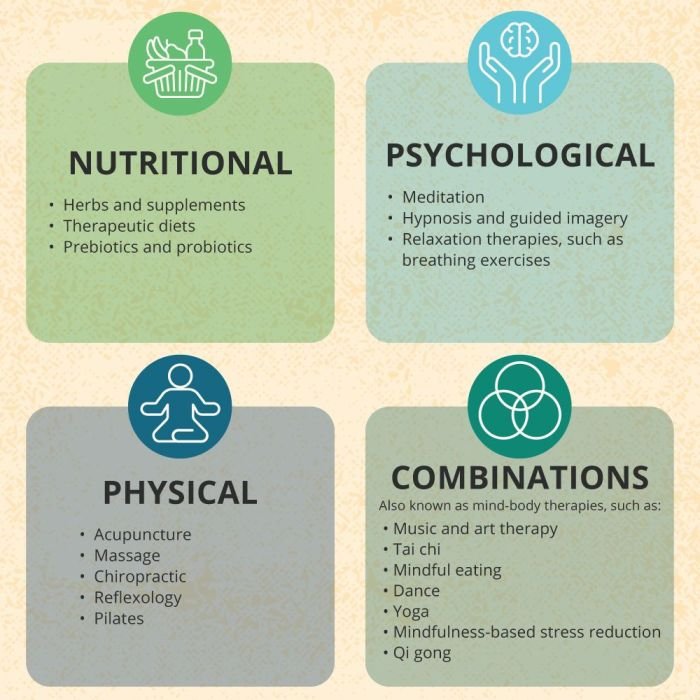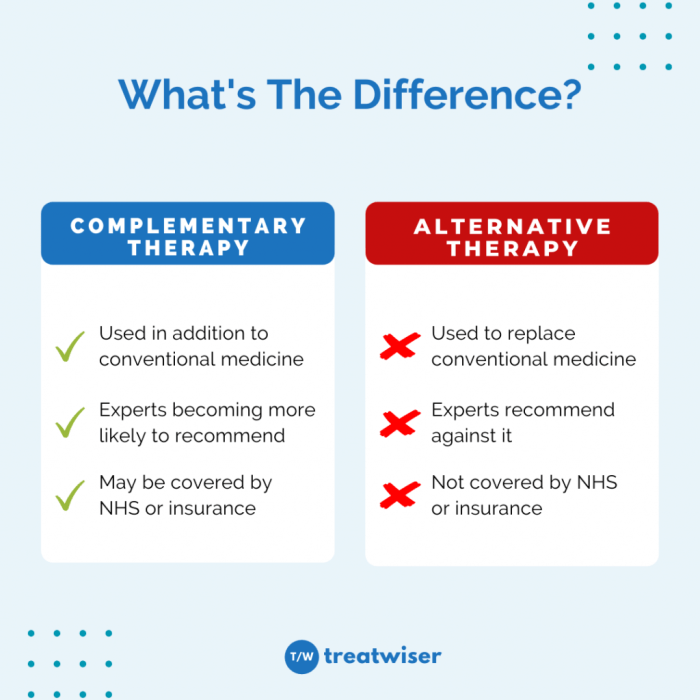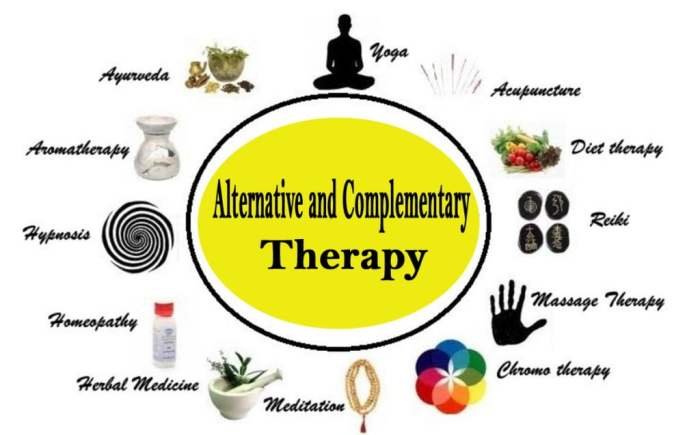Integrative health care – Integrative healthcare, a philosophy that emphasizes a whole-person approach to health and well-being, has gained significant traction in recent years. This approach, which combines conventional medicine with complementary and alternative therapies, aims to address the root causes of illness and promote optimal health.
Unlike conventional medicine, which often focuses on treating symptoms, integrative healthcare takes into account the physical, mental, emotional, and spiritual aspects of an individual’s health.
Integrative healthcare draws upon a diverse range of modalities, including acupuncture, yoga, meditation, herbal medicine, and nutritional therapy. These therapies are carefully chosen and integrated into a personalized care plan, working in conjunction with conventional medical treatments. By addressing the individual’s unique needs and preferences, integrative healthcare empowers patients to take an active role in their own health journey.
Defining Integrative Healthcare

Integrative healthcare is a holistic approach to health and well-being that combines conventional medicine with complementary and alternative medicine (CAM) therapies. It aims to treat the whole person, considering their physical, mental, emotional, and spiritual needs.
Core Principles of Integrative Healthcare
Integrative healthcare is guided by several core principles that emphasize a collaborative and patient-centered approach. These principles include:
- Patient-Centered Care:Integrative healthcare prioritizes the individual patient’s needs, preferences, and values. It encourages active participation in decision-making and empowers patients to take responsibility for their health.
- Holistic Approach:Integrative healthcare recognizes that health is multifaceted and involves the interconnectedness of physical, mental, emotional, and spiritual well-being. It addresses the root causes of illness and promotes overall wellness.
- Evidence-Based Practices:Integrative healthcare emphasizes the use of therapies that have been scientifically validated and shown to be effective. It encourages research to further evaluate the efficacy and safety of CAM therapies.
- Collaboration:Integrative healthcare involves collaboration between conventional healthcare providers and CAM practitioners. This ensures that patients receive comprehensive and coordinated care.
- Prevention and Wellness:Integrative healthcare emphasizes proactive measures to prevent illness and promote optimal health. It encourages lifestyle modifications, such as healthy diet, regular exercise, stress management, and adequate sleep.
Differences from Conventional Medicine
Integrative healthcare differs from conventional medicine in its approach to health and treatment. While conventional medicine focuses primarily on treating disease with pharmaceuticals and surgical interventions, integrative healthcare takes a more holistic and personalized approach.
- Focus on the Whole Person:Integrative healthcare considers the individual’s unique circumstances, including their physical, mental, emotional, and spiritual needs, while conventional medicine often focuses solely on the physical symptoms of illness.
- Emphasis on Lifestyle Modifications:Integrative healthcare emphasizes the importance of lifestyle factors, such as diet, exercise, stress management, and sleep, in maintaining health and preventing disease. Conventional medicine may not always prioritize these factors.
- Use of Complementary and Alternative Therapies:Integrative healthcare incorporates CAM therapies, such as acupuncture, yoga, meditation, and herbal medicine, alongside conventional treatments. Conventional medicine typically focuses on pharmaceuticals and surgical interventions.
- Collaborative Approach:Integrative healthcare encourages collaboration between conventional healthcare providers and CAM practitioners, while conventional medicine may not always embrace this approach.
Examples of Integrative Healthcare Approaches
Integrative healthcare encompasses a wide range of therapies and practices. Some common examples include:
- Acupuncture:A traditional Chinese medicine technique that involves inserting thin needles into specific points on the body to stimulate energy flow and promote healing.
- Yoga:A mind-body practice that combines physical postures, breathing techniques, and meditation to improve flexibility, strength, and overall well-being.
- Meditation:A practice that involves focusing the mind on a single point of attention, such as breath or a mantra, to promote relaxation, reduce stress, and improve mental clarity.
- Herbal Medicine:The use of plants and their extracts for medicinal purposes. Herbal remedies can be used to treat a wide range of conditions, from mild ailments to chronic diseases.
- Massage Therapy:A manual therapy that involves applying pressure to the muscles and soft tissues of the body to relieve tension, improve circulation, and promote relaxation.
Benefits of Integrative Healthcare
Integrative healthcare offers a holistic approach to health and well-being, combining conventional medicine with complementary therapies. This approach aims to address the whole person, considering their physical, mental, emotional, and spiritual aspects. Evidence suggests that integrative healthcare can provide various benefits for individuals seeking to improve their overall health and well-being.
Benefits for Various Conditions, Integrative health care
Integrative healthcare has shown promise in managing various health conditions. Here are some examples:
- Chronic Pain:Studies have shown that combining conventional pain management with complementary therapies like acupuncture, massage, and yoga can be effective in reducing chronic pain and improving quality of life.
- Cancer:Integrative therapies like mindfulness, meditation, and nutritional counseling can help manage cancer-related symptoms, improve quality of life, and potentially enhance treatment outcomes.
- Mental Health:Integrative therapies like mindfulness-based stress reduction (MBSR) and cognitive-behavioral therapy (CBT) have demonstrated effectiveness in managing anxiety, depression, and other mental health conditions.
- Cardiovascular Disease:Lifestyle interventions like stress management techniques, exercise, and dietary changes are often incorporated into integrative healthcare programs to manage cardiovascular risk factors and improve heart health.
Benefits for Overall Well-being
Integrative healthcare can contribute to overall well-being by addressing various aspects of health.
- Stress Reduction:Techniques like yoga, meditation, and deep breathing exercises are often used in integrative healthcare to promote relaxation and reduce stress levels. This can lead to improved mood, better sleep, and enhanced overall well-being.
- Improved Sleep:Integrative approaches may include relaxation techniques, herbal remedies, and lifestyle modifications to address sleep problems. These interventions can promote better sleep quality and improve overall health.
- Enhanced Immunity:Lifestyle factors like nutrition, exercise, and stress management, often emphasized in integrative healthcare, can contribute to a robust immune system and reduced risk of illness.
- Increased Energy Levels:By addressing factors like nutrition, sleep, and stress, integrative healthcare can help individuals feel more energized and improve their overall vitality.
Role in Disease Prevention
Integrative healthcare emphasizes a proactive approach to health, focusing on preventing disease rather than just treating symptoms.
- Lifestyle Modifications:Integrative healthcare often incorporates lifestyle changes like healthy eating, regular exercise, stress management, and adequate sleep to reduce the risk of chronic diseases. These modifications can contribute to a healthier lifestyle and overall well-being.
- Personalized Approaches:Integrative healthcare providers work with individuals to create personalized plans that address their specific needs and risk factors. This tailored approach can help individuals make positive lifestyle changes and prevent disease.
- Early Detection:Some integrative therapies, like acupuncture and massage, may help detect health issues early on. This early detection can allow for timely intervention and potentially improve treatment outcomes.
Key Modalities in Integrative Healthcare

Integrative healthcare emphasizes a holistic approach to health and well-being, drawing upon a diverse range of modalities to address the interconnected aspects of physical, mental, emotional, and spiritual health. This section explores some of the most common modalities used in integrative healthcare, their applications, and potential benefits.
Common Integrative Healthcare Modalities
Integrative healthcare encompasses a wide array of therapeutic approaches, each addressing specific aspects of health and well-being. The following table provides an overview of some common modalities, their applications, and potential benefits:
| Modality | Application | Benefits | Considerations |
|---|---|---|---|
| Acupuncture | Pain management, nausea, anxiety, insomnia, fertility issues | Pain relief, reduced anxiety and stress, improved sleep quality, enhanced fertility | May not be suitable for everyone, potential for bruising or bleeding, need for a qualified practitioner |
| Yoga | Stress reduction, flexibility, strength, balance, mindfulness | Improved physical and mental well-being, reduced stress and anxiety, increased flexibility and strength, enhanced mindfulness | May not be suitable for individuals with certain physical limitations, need for proper instruction and modifications |
| Meditation | Stress reduction, anxiety management, improved focus and concentration, emotional regulation | Reduced stress and anxiety, improved sleep quality, enhanced focus and concentration, increased self-awareness | May require practice and patience, need for a quiet and comfortable environment |
| Massage Therapy | Pain management, stress reduction, muscle tension relief, improved circulation | Pain relief, reduced stress and anxiety, improved sleep quality, increased circulation | May not be suitable for individuals with certain medical conditions, need for a qualified practitioner |
| Herbal Medicine | Various health conditions, including digestive issues, sleep problems, anxiety, and inflammation | Natural and holistic approach to health, potential for fewer side effects than conventional medications | Need for qualified practitioner, potential for interactions with other medications, may not be suitable for everyone |
| Nutritional Therapy | Weight management, chronic disease prevention, improved energy levels, optimal health | Improved overall health and well-being, reduced risk of chronic diseases, enhanced energy levels, improved digestion | Need for qualified practitioner, individualised approach, potential for dietary restrictions |
Visual Representation of Modalities
A visual representation of the relationship between different integrative healthcare modalities could depict a central circle representing “holistic health” with spokes radiating outwards representing different modalities. The spokes could be connected by lines or arrows, illustrating how each modality contributes to the overall well-being of the individual.
Integrative health care recognizes the interconnectedness of our well-being, taking a holistic approach that considers mind, body, and spirit. This philosophy extends beyond traditional medicine, encompassing practices like mindfulness and even beauty treatments. For instance, total skin and beauty birmingham offers a range of services that promote healthy skin and a sense of self-care, contributing to overall well-being.
Ultimately, integrative health care aims to empower individuals to take charge of their health and achieve optimal wellness.
For example, acupuncture could be linked to pain management, while yoga could be connected to stress reduction and flexibility. The visual would emphasize the interconnectedness of these approaches and their combined impact on overall health.
Lifestyle Interventions in Integrative Healthcare
Lifestyle interventions play a crucial role in integrative healthcare, focusing on promoting healthy habits and behaviors that support overall well-being. These interventions often involve:
- Stress management:Techniques like mindfulness, meditation, yoga, and deep breathing exercises can help manage stress and promote relaxation.
- Physical activity:Regular exercise is essential for maintaining physical health, reducing stress, and improving mood.
- Healthy diet:A balanced diet rich in fruits, vegetables, whole grains, and lean protein provides essential nutrients for optimal health.
- Adequate sleep:Getting enough sleep is vital for physical and mental restoration, improving cognitive function and mood.
- Social connections:Strong social relationships provide support, reduce stress, and contribute to overall well-being.
Lifestyle interventions are often considered the foundation of integrative healthcare, providing a framework for promoting health and preventing disease.
Integrative Healthcare in Practice

Integrative healthcare is more than just a collection of different therapies; it’s about creating a personalized approach to wellness that considers the whole person. This section explores how to find an integrative healthcare provider, how it’s integrated into existing healthcare systems, and the importance of patient education and shared decision-making.
Finding and Working with an Integrative Healthcare Provider
Finding an integrative healthcare provider can be a journey. It’s essential to find a provider who understands your needs and values, and who can work with you to develop a personalized plan. Here are some steps you can take to find a provider:
- Start by searching online directories for integrative healthcare providers in your area. The American Association of Integrative Medicine (AAIM) and the National Center for Complementary and Integrative Health (NCCIH) have helpful resources.
- Ask your primary care physician or other healthcare providers for recommendations. They may know of integrative healthcare providers in your area.
- Check with your insurance company to see which integrative healthcare providers are covered by your plan.
- Once you’ve identified a few potential providers, schedule a consultation to meet them and discuss your health goals.
Once you’ve found a provider, it’s important to work with them to develop a plan that meets your individual needs. This may involve discussing your medical history, current symptoms, lifestyle, and personal preferences. Be open and honest with your provider, and don’t hesitate to ask questions.
Integrating Integrative Healthcare into Existing Healthcare Systems
Integrative healthcare is increasingly being incorporated into traditional healthcare settings. This integration can take many forms, such as:
- Offering integrative therapies alongside traditional treatments:Many hospitals and clinics now offer services like acupuncture, massage therapy, and yoga alongside traditional medical treatments. This allows patients to access a wider range of care options and can help to improve their overall well-being.
- Creating dedicated integrative healthcare centers:Some healthcare systems are establishing dedicated centers for integrative healthcare. These centers offer a comprehensive range of services, including acupuncture, massage therapy, nutrition counseling, and mind-body practices. This allows patients to receive personalized care from a team of integrative healthcare professionals.
Integrative healthcare emphasizes a holistic approach, considering all aspects of a person’s well-being. This approach can be found in various settings, including health clubs like the boca raton health club , which often offer wellness programs that encompass fitness, nutrition, and stress management.
By integrating these elements, integrative healthcare aims to empower individuals to take control of their health and achieve a greater sense of balance and well-being.
- Training healthcare professionals in integrative medicine:Many medical schools and residency programs are now incorporating training in integrative medicine. This helps to ensure that future generations of healthcare providers are equipped to integrate these therapies into their practice.
Patient Education and Shared Decision-Making
Patient education and shared decision-making are crucial aspects of integrative healthcare. It is important to empower patients to understand their health conditions and treatment options. This can help them to make informed decisions about their care.
“The goal of integrative healthcare is to empower patients to become active participants in their own health and well-being.”
Integrative healthcare embraces a holistic approach, considering the physical, mental, and spiritual aspects of well-being. If you’re passionate about this approach and seeking a fulfilling career in the medical field, you might want to explore uci health careers.
UCI Health is known for its commitment to integrative medicine, offering a range of programs and services that align with this philosophy.
Integrative healthcare emphasizes the importance of collaboration between the patient and the provider. This allows for a more personalized approach to care, where the patient’s values and preferences are considered.
Future Directions in Integrative Healthcare: Integrative Health Care

The field of integrative healthcare is constantly evolving, driven by advancements in research, technology, and a growing understanding of the interconnectedness of mind, body, and spirit. As we look towards the future, several exciting trends and developments are shaping the landscape of integrative healthcare, promising to enhance its reach, efficacy, and impact on global health.
Emerging Trends in Integrative Healthcare Research and Practice
Integrative healthcare research is rapidly expanding, focusing on understanding the mechanisms underlying the effectiveness of various modalities and exploring their potential applications in addressing specific health conditions.
- Personalized Integrative Medicine:Personalized medicine, which tailors treatment plans to individual patients based on their unique genetic makeup, lifestyle, and health history, is becoming increasingly integrated with integrative healthcare approaches. This personalized approach allows healthcare providers to develop more targeted and effective treatment strategies.
- Precision Medicine:Precision medicine aims to identify and address the specific molecular and cellular changes that contribute to disease. Integrative healthcare modalities, such as nutrition, lifestyle modifications, and mind-body practices, can play a crucial role in supporting precision medicine strategies by optimizing individual responses to treatment and promoting overall well-being.
- Integrative Oncology:Integrative oncology is a growing field that combines conventional cancer treatments with complementary therapies, such as acupuncture, yoga, and mindfulness-based stress reduction, to address the physical, emotional, and spiritual needs of cancer patients.
Final Conclusion

The future of healthcare is undoubtedly intertwined with the principles of integration. As scientific research continues to validate the efficacy of complementary and alternative therapies, integrative healthcare is poised to become an increasingly integral part of mainstream medical practice. By embracing a holistic approach, we can unlock a new era of healthcare that prioritizes well-being, empowers individuals, and fosters a more harmonious relationship between mind, body, and spirit.
FAQ Section
What are the key differences between integrative healthcare and conventional medicine?
Integrative healthcare differs from conventional medicine in its approach to health and treatment. While conventional medicine focuses on treating symptoms using pharmaceuticals and surgical interventions, integrative healthcare takes a holistic view, considering the individual’s physical, mental, emotional, and spiritual well-being.
It emphasizes a collaborative approach between patient and provider, incorporating complementary and alternative therapies alongside conventional treatments.
Is integrative healthcare covered by insurance?
Insurance coverage for integrative healthcare varies widely depending on the specific therapies, insurance provider, and location. Some insurance plans may cover certain modalities, such as acupuncture or massage therapy, while others may not. It’s essential to check with your insurance provider to determine your coverage.
Can anyone benefit from integrative healthcare?
Integrative healthcare can benefit individuals of all ages and health backgrounds. Whether you’re seeking to prevent disease, manage chronic conditions, or simply enhance your overall well-being, an integrative approach can offer a personalized and comprehensive path to optimal health.